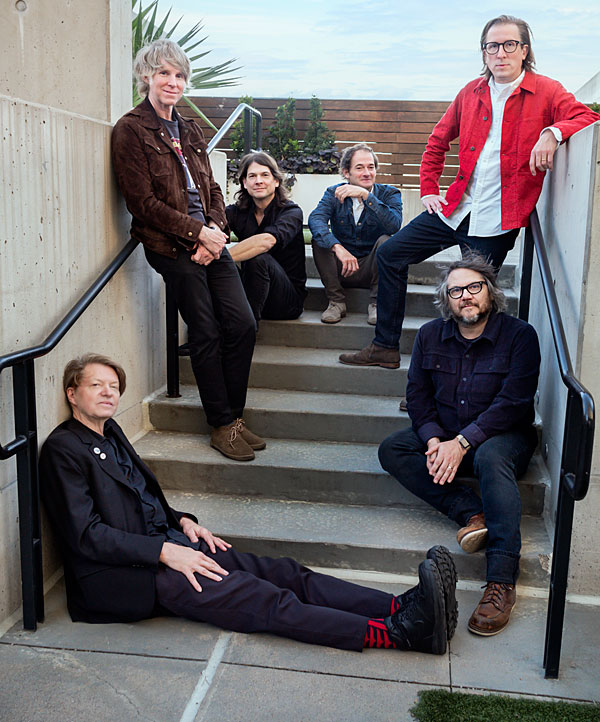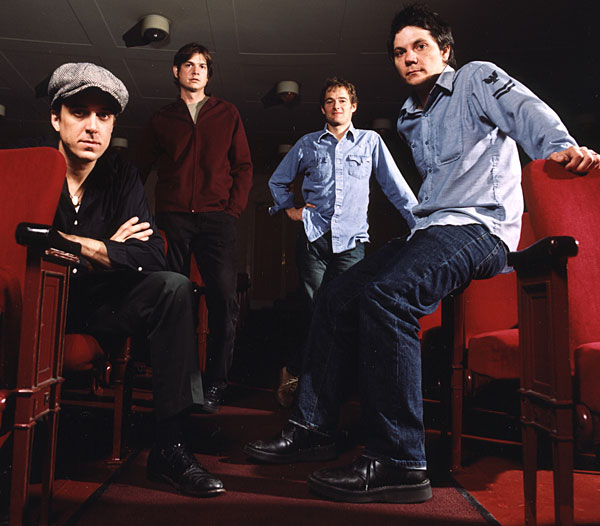| Columns Retired Columns & Blogs |
Great questions as well.
Wilco still rules.
Tweedy: Oh, I think there was a conversation about the two approaches, but it would have been very frustrating to try to make a really meticulously studio-crafted album at the same time we were dissecting Yankee Hotel Foxtrot. I think that's maybe one of the things that contributed to the joy of just going through all those tracks with a fine-toothed comb and then just being able to sit down and play a folk song or a country song. We were able to listen to a new song at the end of the day and think, "Well, that's on the record—great! We like that one!" [laughs]
Mettler: When I get to the end of "The Plains," I immediately go back to the album opener, "I Am My Mother," just to start the Cruel Country journey again. It doesn't feel like I need to stop that train.
Tweedy: I try to do that with every record. I actually really do like to listen to the sequence as if it were to continue in a loop. That song, "The Plains," was somewhat chosen as a song that would sound good before "I Am My Mother."

Mettler: It's interesting you say that, because some people set their records up where they'll fade in at the beginning by using the ending of whatever the last track is. Being There [released in October 1996] almost had a similar feel like that to me—or am I projecting myself onto that one?
Tweedy: No, I think it's honestly been something on my mind for a lot of years, because I used to listen to cassettes like that. I used to have the kind of cassette player that would just start playing the other side. I always liked getting disoriented and not really being too concerned with where the songs fell in the sequence of an A side or a B side.
Mettler: That being said, is there a perfectly sequenced record in your mind—an album you can't listen to in any order other than how the artist gave it to you?
Tweedy: I think all my favorite records have the sequencing play a role, for sure. There definitely are lots of songs that, if I hear them individually, I can't help but hear the song that comes after it. I think [the Beatles's] White Album is like that. I don't usually spend that kind of time with many other artists' albums, but I definitely learned a lot from certain bootlegs and archival releases. When the Anthology series started coming from the Beatles and then the Pet Sounds bootlegs—those are all manuals to pore over for any person wanting to make records.
Mettler: You must have loved watching all 8 hours of Peter Jackson's Get Back [the 2021 Beatles documentary] as much as I did, then.
Tweedy: Yes—and I would be 100% onboard with the 12-hour version he supposedly made [chuckles]. When the Beatles would start performing the take I recognize as the take on the record, tears would spontaneously shoot out of my eyes. I'm actually getting choked up just talking about it, because I can't believe I got to see that. It's almost like some- body discovering a video document of Lincoln reading The Gettysburg Address. It just feels so intimate, and to spend time with them for that length of time—it's not for everybody. If you're a casual fan, I can see how it would really be tedious, but the Beatles—those guys have been my companions my whole life. To really get to feel like I was allowed to sit in the room with them, which is what Get Back makes you feel like—it's like you're all just friends. You're welcomed into these intimate moments that are so transformative to the way we understand the Beatles, especially in that time period. That made me so fucking happy, you know? There's so much joy and so much love and trust between them in a time where we were taught to believe there was so much rancor and bitterness. But what they're all doing is allowing each other to sound bad for as long as it takes to sound good.

Mettler: Besides anything by the Beatles, is there one particular record you kept playing over and over as a kid?
Tweedy: Yeah. There's a fair amount of them, to be honest, but I think the first one that comes to mind is maybe a rather underappreciated record in the early Tyrannosaurus Rex catalog called A Beard of Stars (footnote 6). I had a lot of weird records like that because my brother gave me his record collection. He was 12 or 13 years older than me, and he had an esoteric college intellectual record collection. So I had records from artists like Amon Düül, Aphrodite's Child, Edgar Froese, and Tangerine Dream.
Mettler: Are you a closet prog-head, Jeff? You're putting on Nektar and Camel records too?
Tweedy: [laughs] Well, it makes total sense in the context that I have those records alongside my sister's and my aunt's record collection, which were all pop records like Herman's Hermits, Roger Miller, and stuff like that. You can hear all of it in everything I've ever done.
Mettler: That's good to know, because I feel like the long Cruel Country track "Bird Without a Tail/Base of My Skull" is actually a progressive song disguised as a country song.
Tweedy: Well, we wanted to call it that, but we just decided to call whatever we were doing for that album country (footnote 7).
Mettler: Cruel Country also sounds like it could have come out 50 or more years ago.
Tweedy: Absolutely. And I think there's a bigger point being missed sometimes by focusing on and fetishizing sonic quality over the music. It's a misfit, weird thing to judge music based on the perfect scenario. To me, it's way more impressive to hear how '60s country records were designed to be audible through a crowded bar while being played off a jukebox and how [bar patrons] can still make that connection with music that's fighting upstream like a salmon on the way to spawn. [laughs] Those notes in those songs, the vocal melodies, and those guitar parts are all designed to get through a din of things masking them—which is an amazing audio feat in itself.

Mettler: Is there an example of a country record from that era you can give me to back that up?
Tweedy: Well, any Roger Miller album, or any Buck Owens album. You're not going to listen to those in a quiet room and go, "Oh yeah, I get it now." You got it when you could almost not hear it, and it adds a certain amount of joy to it that it can survive that journey from the speaker to your ear.
I don't want to be too dismissive of the audiophile approach because I admire that too. I'm 100% behind anybody finding something they feel passionate about when it comes to sound. I want a record that sounds great to me, and I want to be able to listen to it in an environment where I can hear things, and where I can get excited to hear all the things I know are there. All I really wanna hear is the connection. I really wanna hear the consciousness and the heart and the spirit on the other side of the speakers. If that can get to me, all the other stuff really doesn't matter. And I know it can get to me, because it's gotten to me from recordings from the 1920s.
I would hope people are able to get the experience I've had from listening to old records. That is just a feeling of connection to the thread of humanity, that there's a constant flow we are all a part of. And certainly, as a person who writes songs, I'm conscious of that all the time—that I'm just adding to this constant thing that has been sustaining for humans for so long. You don't necessarily want to reroute it. Everybody's welcome to add to it and be a part of it, but some people forget they're a part of it. Sometimes, you even feel alienated from it.
But I think records, at their best, maybe remind people we're not that different than we've ever been, and we're not that different from each other. Learning that from old records is learning we've really been the same for a long time. That has been oddly heartening, in spite of the fact that it reminds me we've managed to not fix a lot of our problems for a long time.

Mettler: There are times I want to hear a totally pristine record, and other times I don't mind if I hear crackles and pops because I remember those albums that way, and the music ultimately got through to me. Do you have records like that?
Tweedy: For sure! Actually, those are the records that became your records. That's kind of how they became your records. In fact, I've definitely had the experience of listening to someone else's vinyl copy of an album I know and thinking, "Why doesn't it pop there? Why am I not hearing that?" It's because it reached you. It got to you, and it became yours. People forget that sometimes.
Footnote 7: In the press notes for Cruel Country, Tweedy said, "Wilco is digging in and calling it Country."

Great questions as well.
Wilco still rules.